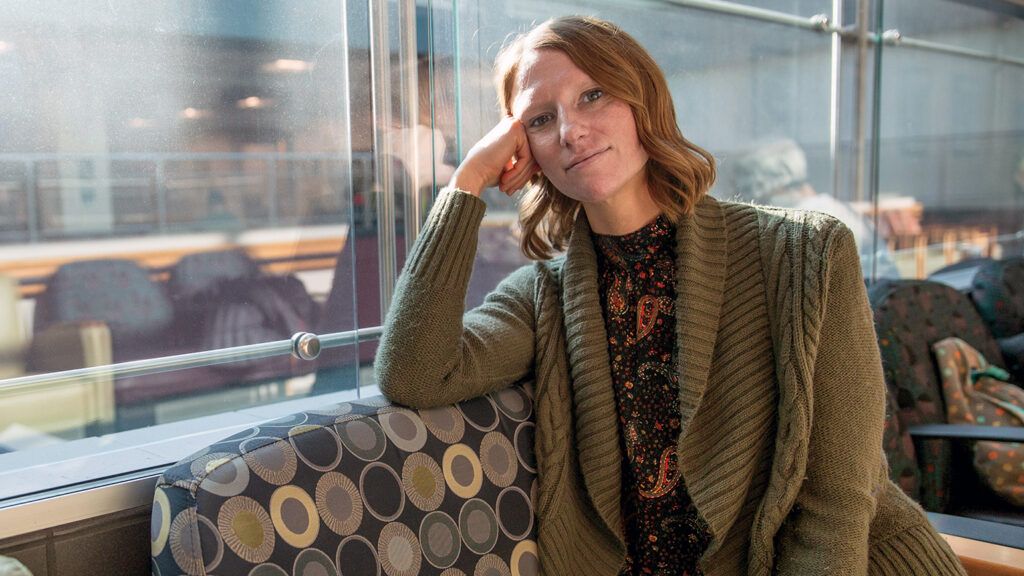That December day in 2014, I bounced my baby on my knee and tried to occupy my toddler while my 92-year-old grandfather rummaged through the closet for the right polo shirt to wear for our first trip to the Asheville, North Carolina, VA hospital. “Some people might think I’m prissy,” Grandaddy Bill said in his lilting Southern accent, “but I just like to look nice.” My grandfather had moved into our basement apartment from my sister’s house a month ago so that I could care for him as his Parkinson’s disease and mild dementia progressed.
I’d known this new arrangement was never going to be easy. But I was surprised that I was already gritting my teeth. Just convincing him to go in for a checkup today had been a struggle. “I hate being moved around,” he said. “I wish I hadn’t lived this long.”
An hour later, I wheeled Grandaddy Bill into the VA hospital. “Careful!” he yelled. “I’m sorry,” I told him. “I know you didn’t want to come today.” We took a seat in the waiting room. Dozens of veterans, young and old, male and female, walked and wheeled their way to the various clinics. A lanky man sitting across from us adjusted his Vietnam Veteran cap. “You’re World War II, aren’t you?” he said to Bill.
Although deaf in his left ear, Grandaddy Bill still refused to get a hearing aid, so I repeated the man’s question loudly into his right ear. “World War II, yes, sir,” Bill said proudly. “Army, South Pacific.”
“Not many of you guys around anymore!” the man said.
“No, there sure ain’t,” Bill told him. “I used to organize a yearly Army reunion, but we had to call it off because it became a last man’s club.” Grandaddy Bill had been a charismatic host, throwing huge parties at the house where he and my grandmother used to live on the South Fork River in Belmont, North Carolina, near us.
This charming man could, however, be strict and impatient with his unruly young granddaughter. The first night I’d ever spent away from my parents was at my grandparents’ house. I was six. It was almost midnight, and I kept crying to go home. “Enough of this yammering!” Grandaddy Bill snapped. “No! Take me home!” I yelled. Back and forth we went, as stubborn as mules, until Bill drove me back to my parents’ place, so angry he didn’t speak a word the whole drive.
I breathed a sigh of relief when the rest of our visit to the VA passed uneventfully. A minor miracle—it seemed as if I was always doing something to aggravate my grandfather. Once when I was 10, I removed an ornament with my sister’s name etched in gold from my grandparents’ Christmas tree. I scratched out her name and wrote my own with the ornament’s hook. Grandaddy Bill came up behind me and yanked it out of my hand, frightening me. “You are just too much!” he yelled, his voice thunderous. Those words seared themselves into my brain. From that point on, I steered clear of my grandfather. My mother died when I was 17, and Grandaddy Bill said, “Let me help you.” He tried to take me in his arms, but I shrank away from him. The last thing I wanted was solace from this man I’d hardly spoken to in years, who’d petrified me as a child.
Grandaddy Bill’s authoritarian nature carried over into our new relationship. Every morning, he would shout into the baby monitor at eight o’clock sharp, “Maaaarrryyy! Get down here with my breakfast!” I’d bring him his food, my jaw clenched. Later in the day, he’d yell, “Maaaarrryyy, come turn up the television!” Grandaddy Bill demanded a rigid schedule for his meals, his medications and his TV shows. His need for routine was a gift to me as a new mother in some ways. Still I resented his yelling and impatience. I tried to remind myself how hard it must be for someone who’d run his own successful architectural business to become dependent on others.
After months of mounting resentment, I told him, “Grandaddy Bill, I know it’s frustrating not to be able to do for yourself anymore, but I not only have the children to care for but sometimes I need to go the bathroom and eat as well. And the disrespectful way you speak to me has to stop.” This was the first time I’d ever had a real talk with my grandfather, much less admonished him.
“Yes, ma’am,” he said mockingly, but he seemed to take my words to heart and rarely spoke disrespectfully to me again. When he needed something, he even started asking, “Could I have some help?”
During our trips to the VA, we slowly got to know each other. When Bill went in for a monthly checkup, a young man in a wheelchair who was missing a leg introduced himself as an Iraq War veteran and asked Bill, “Were you in combat, sir?” All the veterans we met there treated the eldest among them like royalty.
“No, I was a mapmaker,” Bill said. “We’d go up in helicopters and snap aerial photographs and piece them together like a puzzle. I’d draw the maps from that.”
“Wow, Grandaddy Bill, I didn’t know that!” I said. “That’s so cool.”
“I’m a cool dude,” he said, chuckling. “After the war, I studied and practiced on my own, learning how to draw house plans.” I’d had no idea he’d started his business without a degree. “You’re the very definition of a self-made man,” I said.
A few months later, Grandaddy Bill had to have cataract surgery. Ornery as ever, he refused to take off his wedding ring, even after the doctor explained the risk of contamination and infection. “Since I first put this ring on, I’ve never once taken it off,” Bill said, “and I’m not about to start now.” He told the doctor how he and my grandmother, who’d died of cancer 12 years earlier, had loved going ballroom dancing. Another wonderful and surprising thing I’d never known!
“Don’t you love all this time we get to spend together here without the kids around?” I asked Bill after the surgery.
“I will say, it is nice to be away from those young’uns.” He smiled at me. “I know you need the break from ’em too. How are you feelin’ lately?”
“Fine, Bill,” I said. “Thanks for asking.” After all these years, my grandfather was actually offering me comfort. It was equally amazing to me that I could accept it. This man I’d avoided and been fearful of for most of my life was now becoming a cherished part of it, something I could never have imagined.
By the summer of 2016, the hearing in Grandaddy Bill’s right ear had gotten so bad that he grudgingly agreed to get a hearing aid. When the audiologist fit the device in his ear, Bill told her that it was too squeaky. I crossed my fingers that he would actually wear it—serving as his personal hearing aid had become a chore.
After the appointment, I asked Grandaddy Bill, “You ready to go to the gift shop and hunt down some chocolate?” “Is the Pope Catholic?” he said. Bill was a chocoholic who averaged 10 king-size candy bars a week. In addition to a lapful of chocolate, he also picked out several new polo shirts. As we finished up our shopping, he took out the hearing aid and handed it to me. “Throw this away,” he told me.
“But Grandaddy Bill…”

“I’m not wearing it, Mary, and that’s that,” he said. I was disappointed but knew when Bill had decided something, that was that. Over the next two years, our visits to the VA became more frequent as Grandaddy Bill’s health continued to decline, Parkinson’s weakening his ability to swallow, his strength and his cognition. In March of 2018, Bill developed a nasty cough. When I came downstairs to his basement apartment to check on him one day, I found him lying in bed, his teeth chattering and his lips blue. “I’m calling an ambulance,” I said. He sat up. “No, Mary, you are not! I ain’t going into no hospital!”
“Sorry, Grandaddy Bill,” I said, laying my hand gently on his shoulder, “but it’s my job to take care of you.” It was the first time in our relationship that I’d overridden his authority, his autonomy. Our roles were shifting, and the more decisions I made for his care, the more I saw that my grandfather and I were cut from the same cloth. Like him, when I decided something, that was that. I wasn’t too much for him anymore. I was just what he needed.
In the following months, Grandaddy Bill fought one bout of pneumonia after another. The only place he still enjoyed visiting was the VA gift shop, a ritual after every appointment. When I took him in for lab tests on a blustery December day, he announced, “I want a World War II Veteran baseball cap.” We searched the gift shop shelves until another vet told us they no longer carried the WWII caps because there weren’t enough men left to buy them. We never got a chance to go to the gift shop again.
On New Year’s Eve 2018, I wheeled Grandaddy Bill into the VA emergency room. Through blue lips, he sang “Jingle Bells” over and over again. “Ouch,” he said as the nurses lifted him onto a stretcher. “What’s hurtin’, Bill?” I asked. “My pride,” he said in a moment of clarity before he began singing again. Then he stopped to look at me, and even through his confusion, he asked, “You okay, honey?”
“Oh, Bill, I’m going to miss you,” I said, squeezing his hand.
After this hospitalization, I moved him into a memory care assisted living facility, where he could get the specialized care he needed. Grandaddy Bill died five months later. I knew I was blessed to have been given the opportunity—one that I’d taken, challenges and all—to get to know my grandfather before it was too late. He was indeed one cool dude.
Read more: Capturing Memories for Someone with Alzheimer’s
For more inspiring stories, subscribe to Guideposts magazine.




